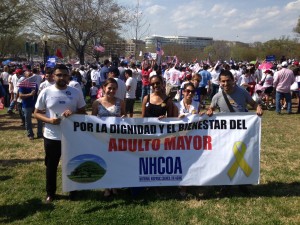The Latino community is united in wanting to fix our nation’s broken immigration policies. Without a doubt, immigration is a galvanizing issue for the nation’s Hispanics, 75% of whom are United States citizens. The toxic rhetoric on immigration has affected us deeply, and that is why Latino voters last November generated a game-changing moment for this debate, giving us an opportunity to arrive at a solution. Our community is engaged and watching this debate closely. It matters not only to voters today, but it stands to shape the views of the nearly 900,000 Latino citizens who will turn 18 each year between now and 2028. This is an issue that impacts us, our families and our neighbors. Our immigration, asylum and naturalization laws must respect the dignity of the individual, reflect our nation’s commitment to human and civil rights and deny state and local encroachment into this federal arena.
During the past decade, there have been several attempts to tackle comprehensive immigration reform. While legislation is set to emerge in the next couple of months, we at NHCOA urge our leaders to be a beacon of hope for fair immigration reform, for our older adults expect nothing less. Indeed, immigration reform is one of the top three concerns for Hispanic older adults today. We stand at the cusp of a unique opportunity to uphold a key American value – ensuring opportunity for all to reach the American dream.
When immigration reform takes effect, there would be important benefits for older adults, direct care workers, family caregivers and individuals with disabilities. A key component of immigration reform is the creation of an expedited process for some unauthorized immigrants, including qualified individuals brought to the U.S. as children (referred to as “DREAMers”) and agricultural workers. In addition, a streamlined visa and expedited process would be established for family unification and highly skilled immigrants with advanced degrees in science, technology, engineering or math (referred to as STEM careers).
Including direct care workers in the STEM category would be particularly beneficial for all older adults. If there is a pathway to citizenship for direct care workers, older adults and people with disabilities will have more support aging with dignity through Community Based Long-Term Services and Support. Today, direct care work is one of the fastest growing jobs in the country.A path to citizenship for direct care workers not only benefits employees and employers in this field, but it also means better quality care for older adults by providing services necessary for daily living, such as preparing meals and making sure older adults are caring for themselves.
It is also important to note that immigration reform should be inclusive of older adults and immigrants with disabilities. Of the approximately 11.5 million unauthorized immigrants currently living in the United States, 1.3 million are between 45 and 54 and another half million are 55 and older. Oftentimes, undocumented workers are forced to take jobs that are physically demanding. This, along with barriers to health care and conditions of poverty can cause disabilities and/or diseases to accumulate over time. Immigrants with permanent resident status have to go through a five-year waiting period before becoming eligible for Medicaid. And even though permanent residents can qualify for Medicare after a five-year waiting period, older immigrants may not qualify if they do not have enough payroll tax credits. Although older adults may become citizens after immigration reform, they may still face substantial barriers to aging in good health and economic security if reform does not secure a humane qualification for Medicare and Medicaid.
There are also cultural, linguistic and age barriers that keep immigrant and diverse older adults from receiving information on public benefit programs. For example, Hispanic older adults may fear discrimination and social stigma if they request information in Spanish. As a result, they may not understand information they receive in English and may not ask to receive information in Spanish. NHCOA and the members of the Diverse Elders Coalition (DEC) play a crucial role in improving the lives of our country’s diverse elders by connecting them with resources to which they are qualified. NHCOA’s Empowerment and Civic Engagement Training teaches older adults about how to petition their elected officials to improve their communities.
Providing a comprehensive immigration reform that includes every generation is crucial in order to move our country forward. NHCOA, along with our National Hispanic Leadership Agenda leaders, support the following key principles to shape immigration reform:
1. Provide a Path to Citizenship for Undocumented Immigrants
A key goal of comprehensive immigration reform should be regularizing the status of the undocumented population, providing a clear and just path to citizenship and bringing them under the protection of our laws. By legalizing immigrants who live, work and contribute to life in the U.S., our nation can deal fairly with those who have responded to an economic reality ignored by the law.
2. Restructure the Immigration System
The ultimate goal of comprehensive immigration reform is to bring all U.S. residents under the protection of our laws. To accomplish this, the immigration system as a whole must be restructured so that it is workable, just and pragmatic. This means eliminating long lines, statutory ambiguity and impractical visa caps, so that the system no longer fosters conditions for the growth of undocumented immigration. Immigration quotas should reflect migration patterns.
3. Preserve Family Unity
Family unity has been a cornerstone of U.S. immigration policy since 1965. If immigration reform is to succeed, it must ensure that family reunification continues to be a primary objective.
4. Ensure Due Process and Civil Rights
The judicial review of immigration cases has been severely limited in the last decade, eroding the system of checks and balances that protect the rights of immigrants. We support repealing jurisdiction-stripping provisions enacted in the Illegal Immigration Reform and Immigrants Responsibility Act of 1996 (IIRAIRA) that prevent the federal courts from reviewing discretionary decisions in cases involving cancellation of removal, certain waivers of inadmissibility, voluntary departure or adjustment of status, as well as removal orders based on minor criminal offenses.
5. Humane Enforcement of Immigration Laws
Our nation’s government has a sovereign right and duty to secure borders and other ports of entry into the United States. Creating a legal, safe and orderly system that manages our immigration flows is an essential part of achieving that objective. Tragically, our current immigration system has helped create a deadly, chaotic and lawless reality that is inconsistent with our national security goals and our constitutional and humanitarian values.
6. Federal Pre-Emption
The Supremacy Clause in the Constitution (Article VI, clause 2) says that when Congress is empowered by the Constitution to legislate on an issue, it preempts or overrides related state legislation. When a conflict exists between federal and state law, the Constitution and federal law prevail. For more than a century, immigration law was considered a federal responsibility.
In recent years, anti-immigrant sentiment programs try to make state and local law enforcement “partners” in immigration enforcement, and the failure of the federal government to enact comprehensive immigration reform has led to dozens of state laws addressing immigration. In 2010 and 2011, 43 states passed 164 anti-immigrant laws. In the first half of 2012, 41 states enacted 114 immigration-related laws and adopted 92 resolutions. Most involve state enforcement of immigration laws. Together, they have contributed to widespread racial/ethnic profiling and the civil rights violations of immigrants, such as Latinos and others who fit the stereotype of “looking foreign,” regardless of their status in the country.
While Congress debates comprehensive immigration reform, NHCOA looks forward to a fair and humane solution that is responsive to our diverse demographic, including older adults – a solution that includes addressing the shortage of health professionals and direct care workers to care for an aging America.
P.S.
NHCOA attended the Immigration Reform Rally in Washington D.C. It was an inspiring day!





